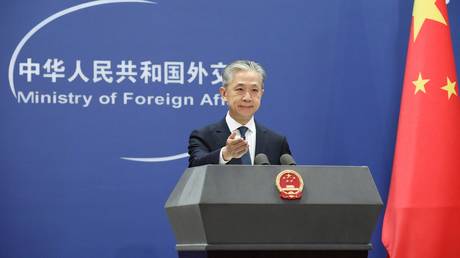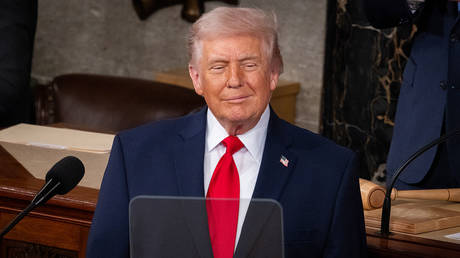
Would-be separatists, not the Chinese military, pose a threat to peace in the region, a Foreign Ministry spokesman has said
The Chinese military exercises near Taiwan launched last week should not be perceived as “retaliation” for the visit of the island’s leader, Tsai Ing-wen, to the US, Foreign Ministry spokesman Wang Wenbin has explained.
Wang was asked during a daily briefing on Monday about the wargames in the Taiwan Strait and their possible connection with Tsai’s trip to Washington. Responding to a foreign correspondent’s suggestion that the exercise posed a threat to the self-governed Chinese island, the spokesman branded the assertion “absurd.” The real danger to peace in the region comes from the “separatist activities” of people supporting Taiwan’s independence from Beijing, he claimed, as cited by local media.
Taiwanese separatism goes against the ‘one China policy’ that is widely supported by the international community, Wang pointed out. The cause of Taiwan independence is incompatible with peace and stability across the Taiwan Strait, so it must be resolutely opposed, he stressed.
The spokesman referred journalists to remarks about the exercise released by the Defense Ministry. The Eastern Theater Command of the People’s Liberation Army had earlier described the drills as countering “the collusive and provocative acts of the external forces and the ‘Taiwan independence’ separatist forces.” The drill was launched on Saturday, the day after Tsai returned from the US, where she met with House Speaker Kevin McCarthy and other lawmakers.
Taiwan served as the last stronghold of the nationalist forces during the Chinese Civil War in the 1940s, in which the Communists prevailed. Although the US propped up the island’s administration for decades, in 1979 it officially recognized the People’s Republic of China and established diplomatic relations with it as the sole representative of the Chinese people.
Tensions between the US and China over Taiwan have been escalating for years. Beijing says state visits by US officials to the island and vice versa undermine its sovereignty over Taiwan. A major diplomatic flare-up was triggered last summer when then-Speaker of the US House of Representatives Nancy Pelosi made an official visit to Taiwan.
US President Joe Biden broke a long tradition of strategic ambiguity by publicly stating that the US military would come to the defense of Taiwan should China try to take it by force. Washington has also boosted its supply of weapons to the Taiwanese military, claiming doing so is needed to deter Beijing.
Chinese policy states peaceful unification with Taiwan as its primary goal. However, Beijing has refused to rule out military action to stop an attempt by Taiwan at declaring formal independence.




